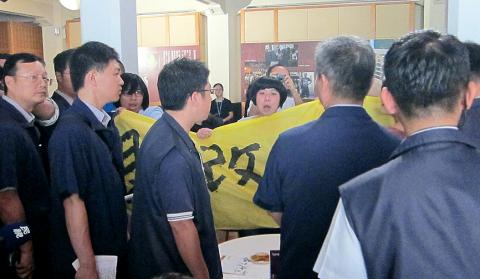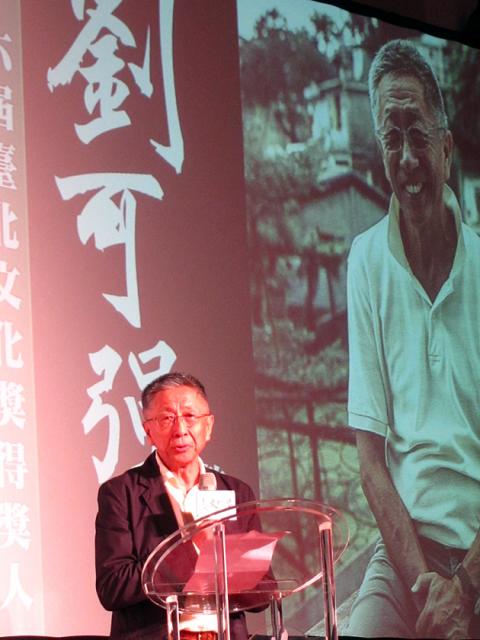Small-scale protests against the Taipei City Government’s handling of urban renewal projects marred the award ceremony of the Taipei Culture Award yesterday, with protesters urging the city government to pay more attention to housing justice in dealing with controversial cases such as the preservation of the Losheng Sanatorium and the urban renewal project in Shihlin District (士林).
Taipei City’s Department of Cultural Affairs yesterday presented the Taipei Culture Award to urban planning activist John Liu (劉可強) and film director Doze Niu (鈕承澤) for their contributions to the preservation of Taipei’s traditions and promotion of the city’s culture through innovative measures.
Liu, an urban planning professor at National Taiwan University, is the mastermind behind reconstruction projects for some of the city’s historical buildings and sites, including Treasure Hill Village (寶藏巖) and Wistaria House (紫藤廬). He also leads an urban design foundation and takes part in various urban reform projects that include the controversial Losheng Sanatorium case.

Photo: Lin Hsiang-mei, Taipei Times
The other recipient, Niu, is a well-known actor and director in Taiwan who gained fame with his two box office hits: Monga (艋舺) and Love (愛).
Describing Liu and Niu as “practitioners of cultural movements in Taipei,” Taipei Mayor Hau Lung-bin (郝龍斌) praised Liu for transforming Taipei’s landscape through urban reform, while lauding Niu for documenting the city’s charm and raising its international profile with his popular movies.
However, the award ceremony was interrupted several times by protesters, with various activists of the Losheng Sanatorium preservation movement waving banners and shouting “Save Losheng Sanatorium” and “Don’t be a culture murderer” while Hau gave his speech in the reception at Taipei Zhongshan Hall.

Photo: Lin Hsiang-mei, Taipei Times
“The Control Yuan’s investigation has confirmed that the sanatorium site is not a suitable site on which to build an MRT maintenance depot. As Mayor Hau said, it is crucial to preserve a city’s history and culture, and so we come here today to urge him to save the historical Losheng Sanatiroum,” said one of the protesters, surnamed Wu (巫), after police escorted the activists from the ceremony.
Losheng Sanatorium was completed in the 1930s on a hill in Sinjhuang District (新莊), New Taipei City (新北市), to isolate people with leprosy, since it was believed to be a contagious and incurable disease at the time.
Before the ceremony began, three advocates for the stalled urban renewal project in Shihlin District, known as Wenlin Yuan (文林苑) project, also launched a small protest outside the ceremony, shouting “save Wenlin Yuan” as Hau entered the building.
The urban renewal project is stalled due to opposition from the Wang (王) family, whose houses were torn down by the city government this year to facilitate the approved project. The family and their supporters have been occupying the construction site and refuse to leave.
Even the band Kao Chiu Ching (拷秋勤), who were invited to perform at the ceremony independent of the protests, called on the city government during their performance “not to sacrifice housing justice over any urban renewal project.”
Liu, in his award acceptance speech, also urged the city government to address the controversial urban renewal projects.
“The city government must take a stance on urban renewal and exercise its authority to resolve the disputes while bearing social justice in mind ... I want to encourage Mayor Hau to take a more positive, active role in handling the issues,” he said.
Meawhile, Democratic Progressive Party Taipei City Councilor Tung Chung-yen (童仲彥) yesterday challenged the city government’s decision to honor Niu for what he described a stereotypical portrait of the old Wanhua District (萬華) in his film Monga, a movie about a group of gangsters from the area.
Department commissioner Liu Wei-kun (劉維公) dismissed Tung’s criticism and said Niu was awarded for his innovation in promoting Taipei and representing life in Taipei, and said the award was not given to him based solely on Monga.

‘DENIAL DEFENSE’: The US would increase its military presence with uncrewed ships, and submarines, while boosting defense in the Indo-Pacific, a Pete Hegseth memo said The US is reorienting its military strategy to focus primarily on deterring a potential Chinese invasion of Taiwan, a memo signed by US Secretary of Defense Pete Hegseth showed. The memo also called on Taiwan to increase its defense spending. The document, known as the “Interim National Defense Strategic Guidance,” was distributed this month and detailed the national defense plans of US President Donald Trump’s administration, an article in the Washington Post said on Saturday. It outlines how the US can prepare for a potential war with China and defend itself from threats in the “near abroad,” including Greenland and the Panama

A wild live dugong was found in Taiwan for the first time in 88 years, after it was accidentally caught by a fisher’s net on Tuesday in Yilan County’s Fenniaolin (粉鳥林). This is the first sighting of the species in Taiwan since 1937, having already been considered “extinct” in the country and considered as “vulnerable” by the International Union for Conservation of Nature. A fisher surnamed Chen (陳) went to Fenniaolin to collect the fish in his netting, but instead caught a 3m long, 500kg dugong. The fisher released the animal back into the wild, not realizing it was an endangered species at

The Chinese Nationalist Party (KMT) is maintaining close ties with Beijing, the Democratic Progressive Party (DPP) said yesterday, hours after a new round of Chinese military drills in the Taiwan Strait began. Political parties in a democracy have a responsibility to be loyal to the nation and defend its sovereignty, DPP spokesman Justin Wu (吳崢) told a news conference in Taipei. His comments came hours after Beijing announced via Chinese state media that the Chinese People’s Liberation Army’s Eastern Theater Command was holding large-scale drills simulating a multi-pronged attack on Taiwan. Contrary to the KMT’s claims that it is staunchly anti-communist, KMT Deputy

The High Prosecutors’ Office yesterday withdrew an appeal against the acquittal of a former bank manager 22 years after his death, marking Taiwan’s first instance of prosecutors rendering posthumous justice to a wrongfully convicted defendant. Chu Ching-en (諸慶恩) — formerly a manager at the Taipei branch of BNP Paribas — was in 1999 accused by Weng Mao-chung (翁茂鍾), then-president of Chia Her Industrial Co, of forging a request for a fixed deposit of US$10 million by I-Hwa Industrial Co, a subsidiary of Chia Her, which was used as collateral. Chu was ruled not guilty in the first trial, but was found guilty